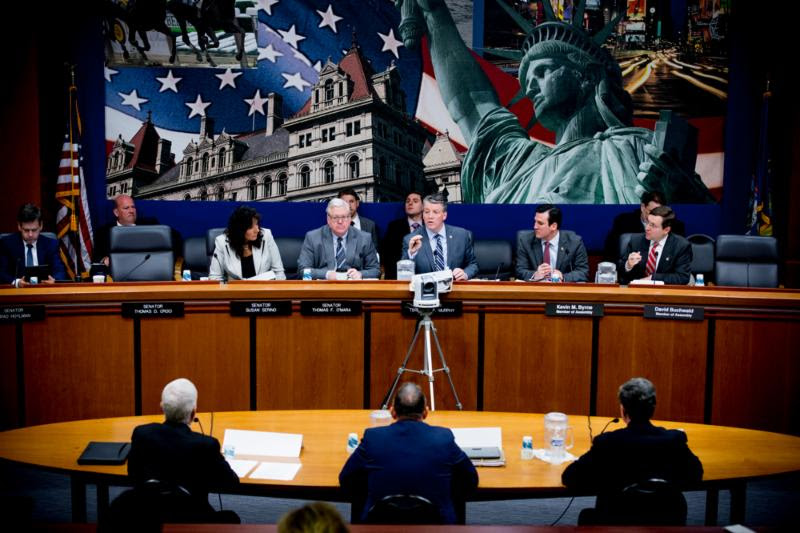Utility Company Heads Grilled During State Senate Hearing on Storms

The leaders of three utilities on the hot seat stood up for their companies’ performances last week during a NYS Senate hearing in Albany to address massive and lengthy power outages that were caused by two powerful winter storms.
State lawmakers questioned the heads of the three utility companies about the apparent shortfalls of restoring power to thousands of Lower Hudson Valley customers following two massive storms in March, which led to universal outrage from local communities. Winter Storm Riley and Winter Storm Quinn wreaked havoc in Putnam and Westchester counties, with downed trees a common sight and lights out throughout both counties.
Local and state lawmakers have slammed companies like Consolidated Edison, New York State Electric and Gas, and Central Hudson for their performances since the bruising storms.
NYSEG CEO Carl Taylor said he was “very proud” of the work done by company workers after the two storms. He said NYSEG was prepared for the widespread weather event, but the Lower Hudson Valley faced the brunt of the storm. More than 3,000 wires went down, 400 poles broke, and damage occurred to other infrastructure that helps power homes and businesses. About 870 workers worked 17- hour days on restoration until all customers were restored, he said.
“This was an extraordinary effort…in an extraordinary event,” Taylor said, adding another storm after Winter Storm Riley hampered recovery efforts. Taylor noted NYSEG has committed millions of dollars into the Brewster division in years past and are developing ways to put together a climate resilient infrastructure.
Central Hudson CEO Michael Mosher said he understands power outages imposes great stress and safety risks on customers, but putting the lights back on after major storms can pose challenges. In advance of Winter Storm Riley, Mosher said the organization prepared and called on mutual aid before the storm got underway. It was the fourth most severe storm in the past 50 years for Central Hudson, Mosher said. While every customer was restored right before the second snowstorm, it caused 50,000 outages, he added.
“Any comparison between any two storms and for that matter restoration performance between utilities is difficult and imprecise,” Mosher said.
Con Ed CEO John McAvoy said as the company attempted to restore power after the first storm, the second storm delayed work. As for the communication breakdown, McAvoy noted a software defect and modeling problem were the cause of that inaccurate information.
McAvoy said Con Ed understands why people were frustrated and upset with the company as they sat in the dark.
“This has been a difficult few weeks for our customers,” McAvoy said.
State Senator Terrence Murphy (R/ Yorktown) said a lot of the frustration came from bad communication and a better plan must be put together to improve services. Murphy said despite investigations following other hurricanes and major storms in recent years, the job done by utilities was “unacceptable.”
“We can’t beat Mother Nature, but we owe it to the people we serve to have a practical, effective emergency plan we can put into effect when outages do occur,” Murphy said.
Murphy asked the three utilities if each company put forward an adequate effort, which didn’t get a strong retort.
“I think you know the answer to that, that’s why we’re here,” Murphy quipped.
State Senator Sue Serino (R/Hyde Park) asked whether the companies would reimburse for any lost food during the storm. Mosher said Central Hudson doesn’t but provided dry ice for customers and Taylor said NYSEG be sending information to affected customers about possible reimbursement. Consolidated Edison is providing reimbursement.
Serino said while she was on the ground in the aftermath of both nor’easters, she noticed Putnam faced a tougher time than Dutchess County restoring power and clearing debris. One 93-year-old constituent, Norma, who lives in Lake Peekskill, had to be rushed to the hospital after she could not get access to her heart medicine a couple days following the storm. When she was released, she was taken to a Red Cross Center in Westchester and ended up wearing the same clothes on her back for eight days while her home had no power.
Norma was also told several times she had power back, when in fact she didn’t that led to more confusion and heartache, Serino said.
“They deserve answers,” Serino said of her constituents.
